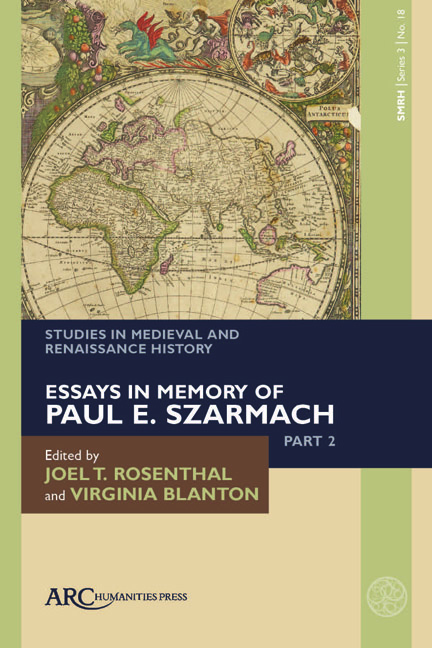Book contents
- Frontmatter
- Contents
- List of Illustrations
- Introduction
- The Development of Constantinian Themes and Their Manifestation in Writings and Coinages of Early England
- Echo and Icon : Life in Stone at Bewcastle, Cumbria
- Jerome of Strido at Chelles: The Legacy of Quedlinburg Codex 74
- Revisiting the Maaseik Zoomorphic Embroideries
- The Old English Version of Alexander’s Letter to Aristoteles and its Use of Binomials
- Agency and Obedience : The Afterlife of St. Swithun in Anglo-Saxon England
- B. and the Vita Harlindis et Renulae
- Wheelock’s Bede and Its Supplementary Materials : Goals and Methods
The Development of Constantinian Themes and Their Manifestation in Writings and Coinages of Early England
Published online by Cambridge University Press: 13 April 2024
- Frontmatter
- Contents
- List of Illustrations
- Introduction
- The Development of Constantinian Themes and Their Manifestation in Writings and Coinages of Early England
- Echo and Icon : Life in Stone at Bewcastle, Cumbria
- Jerome of Strido at Chelles: The Legacy of Quedlinburg Codex 74
- Revisiting the Maaseik Zoomorphic Embroideries
- The Old English Version of Alexander’s Letter to Aristoteles and its Use of Binomials
- Agency and Obedience : The Afterlife of St. Swithun in Anglo-Saxon England
- B. and the Vita Harlindis et Renulae
- Wheelock’s Bede and Its Supplementary Materials : Goals and Methods
Summary
THE RISE TO power of Constantine had an important and lasting impact on British history, literature, coinage, and art. To this day, his association with Britain continues to be highly regarded and observed, as shown in the exhibition and book, Constantine the Great: York's Roman Emperor, celebrating, in 2006, the 1,700th anniversary of his accession at York upon his father Constantius's death on July 25, 306. Although Constantine initially took the title of Augustus (i.e., Emperor) as successor to his father, he later changed his mind because such an assumption of power was an illegal act in the tetrarchic system of the time, accepting instead from the Augustus Galerius the legitimate title of Caesar. Yet the transfer of power from father to son in Britain would continue to be important to Constantine personally, to Roman Britannia, and to Early England.
Upon Constantine's promotion, however, a resentful Maxentius, retired Emperor Maximian's son who found himself left out of the succession, usurped power in Rome on October 28, 306, only to be defeated six years later, to the day, by Constantine during the battle at the Milvian Bridge, October 28, 312. Leading up to that encounter, while recruiting forces, Constantine apparently made a return visit to Britain in late 311 or the early part of 312, commemorated by a special adventus coin-type that was produced as part of a large issue with a wide range of types (notably an armoured-bust type to be discussed at greater length below), struck at the London Mint in preparation for Constantine's campaign against Maxentius. Thus Britain came to serve as a double starting point for him: a place to which he would always trace the root of his authority and a place from which he could fund that decisive march to Rome.
Eusebius's Life of Constantine, composed after the emperor's death in 337, describes Constantine's determination to set out on that campaign to liberate Rome from Maxentius and how Constantine called upon the god of his father Constantius (actually Sol Invictus, “the unconquered sun,” whose image appears on many of Constantine's coins) to protect him against the sorcery of the enemy.
- Type
- Chapter
- Information
- Studies in Medieval and Renaissance HistoryEssays in Memory of Paul E. Szarmach, Part 2, pp. 1 - 16Publisher: Amsterdam University PressPrint publication year: 2024



